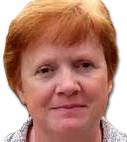

Support for Healthcare
Kate Cheney (left) and Betsy Anagnostelis
As the pace of change in the NHS, in biomedical research and in healthcare education intensified in 2011-12, it became increasingly important to engage with key partnerships highlighted by the UCL Council White Paper and the UCL Research Strategy. Within UCL, the merger with the School of Pharmacy saw a significant addition to UCL Library Services was the School of Pharmacy Library.
Through membership of education and library committees within UCL Partners and in planning for the Francis Crick Institute and beyond, UCL Library Services staff contributed to a range of developments around library services provision, including a review within NHS London and centring around two key areas: expanding access to e-resources for NHS users and developing specialist biomedical library staff skills, enabling library staff to deliver high calibre services and training support.
For over a decade a UCL Library Services-led library consortium of the London Medical Schools (LMSG) has successfully explored the option of licence extension for the provision of e-resources jointly to the participating HEIs and affiliated NHS trusts. The group continued in 2011-12 to secure value for money licensing of new resources that benefit the extended healthcare user base and these have met with much acclaim.
UCL also continued to play a major role in the AHSC pilot. In its Academic Health Science Centres pilot report, JISC Collections conclude: "With the publication of the Finch Report, the issue of extending access to licensed content to the health sector has been highlighted and recommended hence the work undertaken during the AHSC Pilot will prove a good foundation for considering possibilities going forward." UCL Library Services has since been leading efforts, through UCL Partners, to identify the appropriate NHS bodies that might play a role in funding the implementation of the relevant Finch recommendations.
Ways of enabling seamless access to the widening range of healthcare resources are continuously being developed. Healthcare Evidence Resources, for example, was launched on the UCLH intranet - developed collaboratively by UCL and NHS library and hospital staff through a project chaired by Professor Ian Needleman from the unit of Periodontology, Eastman Dental Institute. This provides a single gateway for locating e-resources, online clinical decision making and e-learning tools, as well as library training support.

The School of Pharmacy Library has brought a wealth of resource and expertise to our support for healthcare teaching and research. One specific example of their role in providing specialist training is highlighted by Professor Jane Portlock, Professor of Clinical Pharmacy Education, UCL School of Pharmacy:
" "Our fourth year MPharm students write a Therapeutic Framework, which contains a variety of complex evidence that they need to obtain and critically appraise. The library team provides vital support for the students individually and in groups to get to grips with evidence-based sources, NHS evidence, and making sense of what they find. In addition, this year Peter Field, a member of the library staff, supported the students' training session on NICE evidence sources, which they then as ambassadors for NICE, cascaded to their colleagues across the School of Pharmacy, again with the help of the library team. Without the library's involvement, students would struggle to undertake this advanced independent study, but with library assistance, the students gain confidence in self-directed learning in this subject."
Professor Jane Portlock, UCL School of Pharmacy
The Royal Free Hospital Medical Library was named as the winner of the 2012 Sally Hernando Award for "11½ Things": created and facilitated by the information skills trainer, this innovative online training and development programme was introduced as part of the 2011 biomedical libraries summer school. It is aimed at helping library staff to develop their skills in using social media and, by understanding how these tools are utilised by clinicians, researchers and academic staff, giving library staff an insight into ways that library services can be developed that match user preferences. One example of how this has been applied at the Royal Free is the introduction of a blog, RSS feed and intranet page to support the work of the Trust's QIPP (Quality, Innovation, Productivity and Prevention) programme.
Also on the theme of delivering high calibre services: work on estates in the biomedical libraries led to a host of new spaces and facilities in 2011-12, but some of the benefits were unanticipated when the new spaces were originally envisioned:
" "I am writing to say how grateful I am to you and your team for the use of the fantastic library seminar room for the Waterbirth Workshops. The seminar room 'pebble in the pond' has far reaching effects. The ambient yet professional environment is a tremendous welcome to the soon to be parents. Anxieties are reduced and expectations are created. As a consequence the number of attendees is increasing, the demand so much so that we are considering a second session. Birth partners are also extremely grateful for the timing, support and advice provided at the workshops. The number of waterbirths is certainly increasing; with the far reaching effects of happy parents, contented baby, huge cost savings and a great testimonial to the Royal Free hospital."
Mona Davies, Midwife, Royal Free Hospital
 Close
Close

